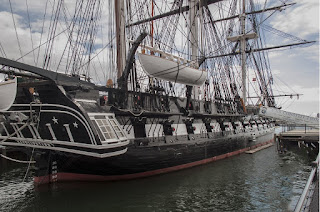 |
| Ship in Boston Harbor Photo by Rick_008 at https://pixabay.com/photos/boston-usa-massachusetts-4634681/ |
U.S. History Chapter 5
Imperial Reforms and Colonial Protests, 1763-1774
I designed a quiz related to chapter 5 at the bottom of this article.
Directions for the quiz:
- Scroll down & click on the first thumbnail to enlarge to full screen.
- Choose an answer for each question.
- Click on the graphic to advance to the next screen.
- The correct answer is on the screen following the question.
- Compare your answers with those provided.
- If you cannot easily see the correct answer, check the captions.
Review the following Chapter 5 pages:
- Introduction
- Confronting and National Debt: The Aftermath of the French and Indian War
- The Stamp Act and the Sons and Daughters of Liberty
- The Townshend Acts and Colonial Protest
- The Destruction of the Tea and the Coercive Acts
- Disaffection: The First Continental Congress and American Identity
- Key Terms
- Summary
Practice learning Chapter 5 Key Terms on Quizlet.
Week 5 Videos:
- History Channel: The French and Indian War Explained (3:22)
- Outcome of the French and Indian War (5:20)
- The Lenape Culture - Medicine (6:17)
- History Channel: Fast Facts About the Proclamation of 1763 (3:00)
- Pontiac’s Rebellion (1:25)
- The Paxton Boys (6:52)
- Crash Course: Taxes and Smuggling (12:18)
- The Sugar Act Song (4:02)
- Stamp Act (4:32)
- History Channel: What were the Townshend Acts? (3:13)
- The Townshend Acts - King George III Announcement (1:49)
- The “Penman of the Revolution” - A Profile of John Dickinson (2:53)
- Crispus Attucks and the Boston Massacre (6:08)
- History Channel: What was the Tea Act of 1773? (3:52)
- Dump It Off (Boston Tea Party Song) (1:30)
- The Coercive Acts - King George III Announcement (1:58)
- History Brief: The First Continental Congress (3:35)
Review the following information featuring the U.S.:
- Colorado (8:00)
- Connecticut (6:59)
- PBS Andrew Jackson (1:26)
- Lincoya: Andrew Jackson’s Indian Son
- The Death of Rachel Jackson, “A Being So Gentle…”
Additional Resources:
Thanks for visiting my Student Survive 2 Thrive blog!
Find additional resources through my site map, topics tabs, or search bar.
Here are some of my articles you may find helpful this week:
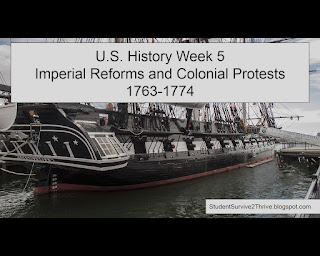 |
| U.S. History Week 5 Imperial Reforms and Colonial Protests 1763-1774 |
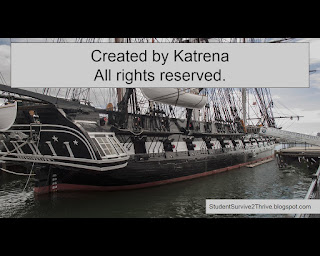 |
| Created by Katrena All rights reserved. |
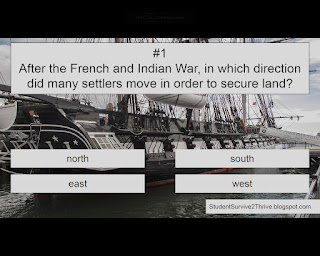 |
| After the French and Indian War, in which direction did many settlers move in order to secure land? Answer choices include: north, south, east, west |
 |
| The correct answer is west. |
 |
| A Native American spiritual leader, ___, united many native villages by encouraging expelling Europeans. Answer choices include: Neolin, Lozen, Blackfish, Shellowee |
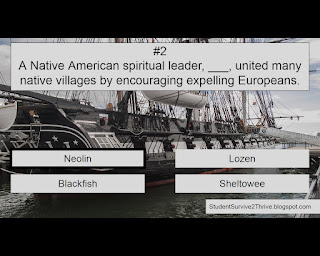 |
| The correct answer is Neolin. |
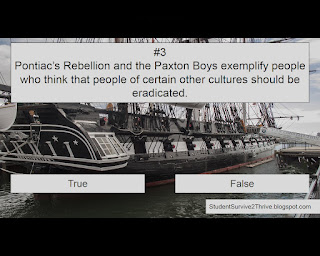 |
| Pontiac’s Rebellion and the Paxton Boys exemplify people who think that people of certain other cultures should be eradicated. Answer choices include: true, false |
 |
| The correct answer is true. |
 |
| The ___ Act required colonists to pay British merchants in silver & gold rather than their paper currency. Answer choices include: Sugar, Stamp, Civilian, Currency |
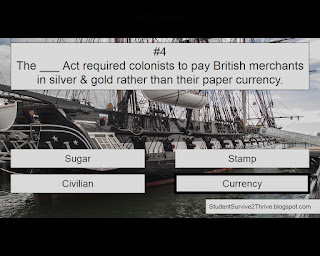 |
| The correct answer is Currency. |
 |
| The colonists were wary of the Sugar Act because it took away their right to ___. Answer choices include: vote, a jury trial, bear arms, life |
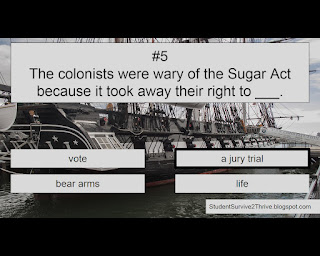 |
| The correct answer is a jury trial. |
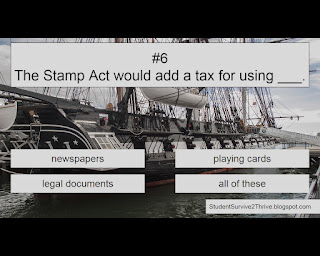 |
| The Stamp Act would add a tax for using ___. Answer choices include: newspapers, playing cards, legal documents, all of these |
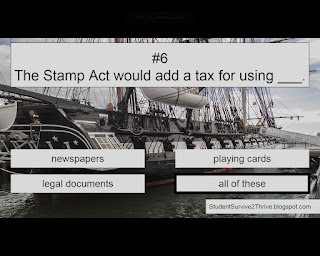 |
| The correct answer is all of these. |
 |
| The colonists’ first official protest was “No taxation without ____.” Answer choices include: good reason, fluctuation, representation, payback |
 |
| The correct answer is representation. |
 |
| The ___ Act required colonists to provide British troops with lodging & food if needed. Answer choices include: Stamp, North American, Quartering, Quickening |
 |
| The correct answer is Quartering. |
 |
| How did the Daughters of Liberty protest the Stamp Act? Answer choices include: They boycotted British goods. They shot British soldiers. They made fake stamps. All of these. |
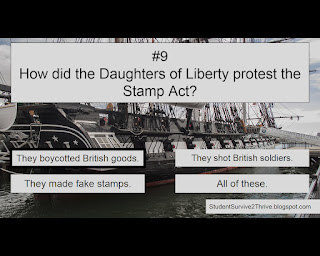 |
| The correct answer is: They boycotted British goods. |
 |
| The Revenue Act granted British customs ___, a type of search warrant to check for contraband on ships. Answer choices include: a cat's paw, a macaroni hat, writs of assistance, acquittals |
 |
| The correct answer is writs of assistance. |
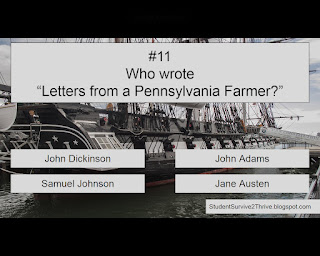 |
| Who wrote “Letters from a Pennsylvania Farmer?” Answer choices include: John Dickinson, John Adams, Samuel Johnson, Jane Austen |
 |
| The correct answer is John Dickinson. |
 |
| The correct answer is: They eventually sided with Massachusetts. |
 |
| In 1768, Lord Hillsborough sent ___ British troops to Boston. Answer choices include: 400, 1400, 4000, or 41,000 |
 |
| The correct answer is 4,000. |
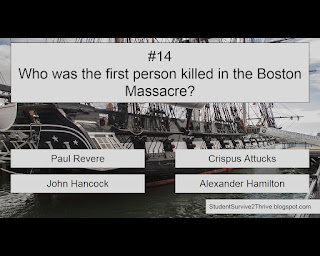 |
| Who was the first person killed in the Boston Massacre? Answer choices include: Paul Revere, Crispus Attucks, John Hancock, Alexander Hamilton |
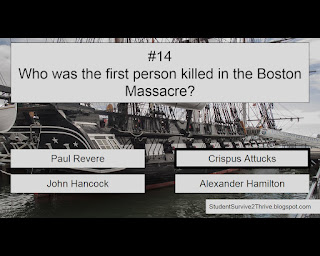 |
| The correct answer is Crispus Attucks. |
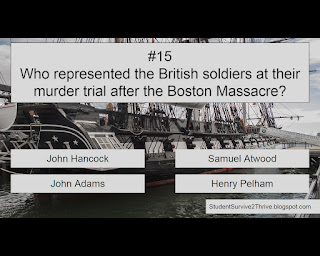 |
| Who represented the British soldiers at their murder trial after the Boston Massacre? Answer choices include: John Hancock, Samuel Atwood, John Adams, Henry Helham |
 |
| The correct answer is John Adams. |
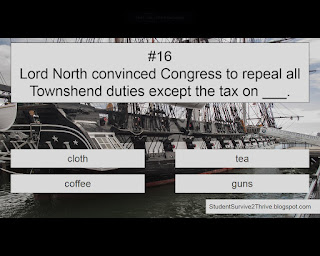 |
| Lord North convinced Congress to repeal all Townshend duties except the tax on ___. Answer choices include: cloth, tea, coffee, guns |
 |
| The correct answer is tea. |
 |
| The correct answer is: They poured tea into the water. |
 |
| American Patriots began calling the Coercive Acts & Quebec Act The ____ Acts. Answer choices include: Inflammatory, Impossible, Intolerable, Ignorant |
 |
| The correct answer is Intolerable. |
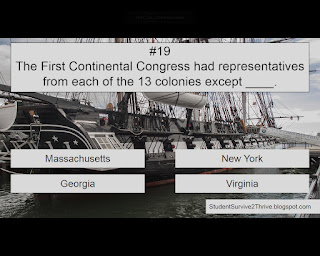 |
| The First Continental Congress had representatives from each of the 13 colonies except ____. Answer choices include: Massachusetts, New York, Georgia, Virginia |
 |
| The correct answer is Georgia. |
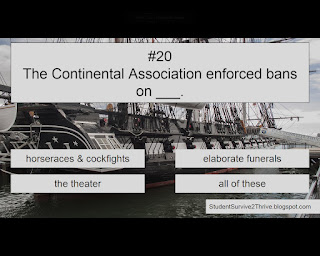 |
| The Continental Association enforced bans on ___. Answer choices include: horseraces & cockfights, elaborate funerals, the theater, all of these |
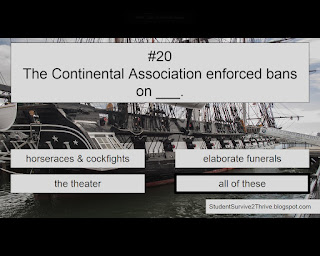 |
| The correct answer is all of these. |

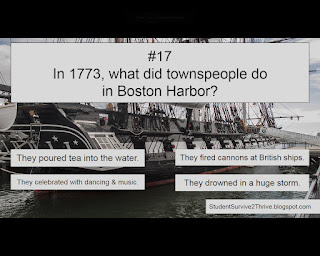

No comments:
Post a Comment
Thanks for reading my article and sending your comment! Please note that I do not place links to other web sites on this blog.
Note: Only a member of this blog may post a comment.